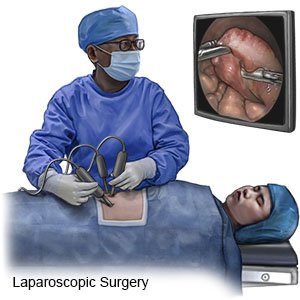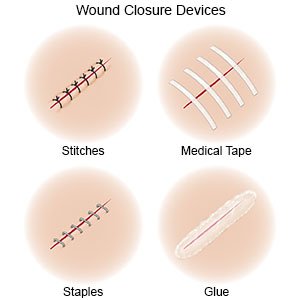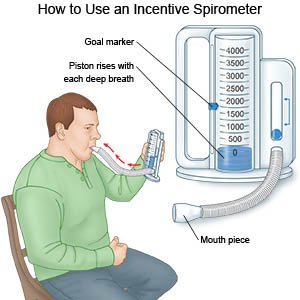Laparoscopic Hiatal Hernia Repair
Medically reviewed by Drugs.com. Last updated on Aug 4, 2025.
AMBULATORY CARE:
What you need to know about laparoscopic hiatal hernia repair:
Laparoscopic hernia repair is surgery to repair a hiatal hernia.
 |
How to prepare for laparoscopic hiatal hernia repair:
- Your surgeon will talk to you about how to prepare for surgery. You may be told not to eat or drink anything after midnight on the day of your surgery. Arrange to have someone drive you home when you are discharged.
- Tell your surgeon about all your current medicines. Your surgeon will tell you if you need to stop any medicine for surgery, and when to stop. You surgeon will tell you which medicines to take or not take on the day of your surgery.
- Tell your surgeon about any allergies you have, including to anesthesia or medicines. You may be given an antibiotic to help prevent a bacterial infection.
- Your surgeon will tell you if you need any tests before your surgery, and when to have them.
What will happen during laparoscopic hiatal hernia repair:
- You will be given general anesthesia to keep you asleep and free from pain during surgery. Your surgeon will make a small incision above your bellybutton. Your surgeon will insert a laparoscope through this incision. A laparoscope is a long metal tube with a light and camera on the end. Your surgeon will insert other instruments by making 2 to 4 smaller incisions at different places on your abdomen. Tools are used to remove the sac that contains your herniated stomach.

- Your stomach will then be placed back into its normal position. Stitches or mesh may be placed to close or decrease the size of your enlarged hiatus (opening in the diaphragm). Your healthcare provider may wrap a portion of your stomach around the esophagus. Your stomach will then be stitched and attached to the abdominal wall. The incisions will be closed with stitches or steristrips and covered with bandages.

What to expect after laparoscopic hiatal hernia repair:
- You will need to do deep breathing exercises after your surgery to decrease your risk for a lung infection. Deep breaths help open your airway. These exercises will be painful because they put pressure on your incisions. You will be shown how to hold a pillow while you do breathing exercises to help decrease pain.
- You may need to follow a soft diet for up to 4 weeks after your surgery.
- Do not drive for a week after your surgery. Do not lift heavy objects. Your healthcare provider will tell you when you can return to your daily activities.
Risks of laparoscopic hiatal hernia repair:
Your esophagus, stomach, blood vessels, or nerves may get injured during the surgery. You may bleed more than expected or get an infection. Problems may happen during your laparoscopic repair that may lead to a laparotomy (open surgery). You may develop another hernia even after you have this surgery. You may also have trouble swallowing and gastroesophageal reflux disease (GERD). You may get a blood clot in your leg or arm. This may become life-threatening.
Call your local emergency number (911 in the US) if:
- You feel lightheaded, short of breath, and have chest pain.
- You cough up blood.
Seek care immediately if:
- Your arm or leg feels warm, tender, and painful. It may look swollen and red.
- Blood soaks through your bandage.
- You have pus or a foul-smelling odor coming from your incision.
- Your bowel movements are black, bloody, or tarry-looking.
- Your vomit looks like coffee grounds or has blood in it.
- You develop shortness of breath or you begin to wheeze.
Call your surgeon or doctor if:
- You have a fever above 101°F (or 100°F if you are older than 65 years).
- You develop a skin rash, hives, or itching.
- You have nausea, or you are vomiting.
- You have bloating or pain that does not improve.
- You have trouble swallowing that does not improve.
- You have heartburn symptoms.
- You have questions or concerns about your condition or care.
Medicines:
You may need any of the following:
- Prescription pain medicine may be given. Ask your healthcare provider how to take this medicine safely. Some prescription pain medicines contain acetaminophen. Do not take other medicines that contain acetaminophen without talking to your healthcare provider. Too much acetaminophen may cause liver damage. Prescription pain medicine may cause constipation. Ask your healthcare provider how to prevent or treat constipation.
- Medicine may be given to decrease or block stomach acid.
- Take your medicine as directed. Contact your healthcare provider if you think your medicine is not helping or if you have side effects. Tell your provider if you are allergic to any medicine. Keep a list of the medicines, vitamins, and herbs you take. Include the amounts, and when and why you take them. Bring the list or the pill bottles to follow-up visits. Carry your medicine list with you in case of an emergency.
Nutrition:
- Eat soft foods as directed. You may need to eat soft foods for up to 4 weeks after surgery. Examples of soft foods include mashed potatoes, pudding, custard, and milkshakes.
- Do not have food or drinks that produce gas. It may be hard for you to burp to release air in your stomach after this surgery. Do not have high-fat foods or carbonated drinks, such as sparkling water or soft drinks. Do not chew gum or drink liquid through a straw. Eat and drink slowly. Chew your food well.
Care for the surgery area as directed:
Carefully wash the area with soap and water. Dry the area and put on new, clean bandages as directed. Change your bandages when they get wet or dirty. If you have steristrips covering the surgery area, do not remove them. They will come off on their own. Do not get in a bathtub, swimming pool or, hot tub until your healthcare provider says it is okay.
Deep breathing:
Take deep breaths and cough 10 times each hour. This will decrease your risk for a lung infection. Take a deep breath and hold it for as long as you can. Let the air out and then cough strongly. Deep breaths help open your airway. You may be given an incentive spirometer to help you take deep breaths. Put the plastic piece in your mouth and take a slow, deep breath, then let the air out and cough. Repeat these steps 10 times every hour.
 |
Activity:
Do not drive for a week after your surgery. Do not lift heavy objects. Ask your healthcare provider when you can return to your daily activities.
Follow up with your surgeon or doctor as directed:
Write down your questions so you remember to ask them during your visits.
© Copyright Merative 2025 Information is for End User's use only and may not be sold, redistributed or otherwise used for commercial purposes.
The above information is an educational aid only. It is not intended as medical advice for individual conditions or treatments. Talk to your doctor, nurse or pharmacist before following any medical regimen to see if it is safe and effective for you.
Further information
Always consult your healthcare provider to ensure the information displayed on this page applies to your personal circumstances.
